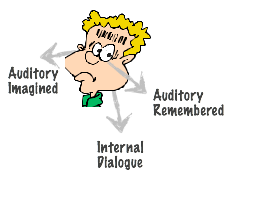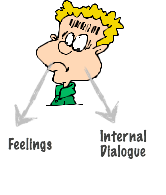Representational Systems
Our 5 Senses
The software of our Brain. Seeing, hearing, feeling, tasting and smelling. How do you personally think?

We think with our 5 senses.
Check this out for yourself by asking yourself the question:
When was the last time that I did the washing up?
And as you remember this incident - I would like you to take away any pictures that you might have!
Now, some people might say “Eh! What’s left?” or I can’t, what else is there? Other people reading this will say, “OK done that”
So now, turn the volume down on any sounds in this memory, and take away any feeling of doing the washing up.
And lastly take away any smell or taste.
What’s left? Nothing!!
You cannot think about this memory (or anything in the future) without using a mixture of your 5 senses. These are what NLP has named ‘Representational Systems’ The building blocks of thoughts.
Check this out for yourself by asking yourself the question:
When was the last time that I did the washing up?
And as you remember this incident - I would like you to take away any pictures that you might have!
Now, some people might say “Eh! What’s left?” or I can’t, what else is there? Other people reading this will say, “OK done that”
So now, turn the volume down on any sounds in this memory, and take away any feeling of doing the washing up.
And lastly take away any smell or taste.
What’s left? Nothing!!
You cannot think about this memory (or anything in the future) without using a mixture of your 5 senses. These are what NLP has named ‘Representational Systems’ The building blocks of thoughts.
The question now is: “Which sense do you favour? Seeing, hearing or feeling? Which ever one is it will be the primary ‘channel’ through which you take in information.
In the box below, we have given you each of the representational systems and more interactive information on each. Click on each of the headings, and see if you can identify your primary preference!
Enter the name for this tabbed section: Visual - Seeing
Visual Preference Body Posture and Characteristics
Visual people generally sit up and look up. Their eyes can be seen to look up left and right often - checking the past with the future and visa versa. Alternatively they will look straight ahead and be seeing pictures in their minds eye.
Visual people generally breathe high up in their chest and often speak very quickly. People who have visual as a preferred method of processing will process information quickly - a picture speaks a thousand words!
Visual people generally sit up and look up. Their eyes can be seen to look up left and right often - checking the past with the future and visa versa. Alternatively they will look straight ahead and be seeing pictures in their minds eye.
Visual people generally breathe high up in their chest and often speak very quickly. People who have visual as a preferred method of processing will process information quickly - a picture speaks a thousand words!
Visual Words:
See
Look
View
Appear
Show
Reveal
Envision
Image
See
Look
View
Appear
Show
Reveal
Envision
Image
Picture
Clear
Foggy
Flash
Watch
Colourful
Sight

Do they communicate in terms of:
Colour or Black/White
Bright or Dim
Contrast
Size
Distance
Location
Movement
Associated/Disassociated
Colour or Black/White
Bright or Dim
Contrast
Size
Distance
Location
Movement
Associated/Disassociated
Enter the name for this tabbed section: Auditory - Hearing
Auditory Preference Body Posture and Characteristics
Auditory people often look like ‘the thinker’. They will sit with one of their hands near or close to either of their ears. Their head might be tilted to the left or right or they could incline their head so that one or other of their ears is more forward. (or backward)
Auditory people generally breathe in the middle of their chest and often their speech is rich and full of tonality. They can often be upset by noise or cope very well with it. They are checking out what they are going to say and what has been said, so their eyes go from side to side. Everything ‘sound’ is important to them. Care-full what you say!!
Auditory people often look like ‘the thinker’. They will sit with one of their hands near or close to either of their ears. Their head might be tilted to the left or right or they could incline their head so that one or other of their ears is more forward. (or backward)
Auditory people generally breathe in the middle of their chest and often their speech is rich and full of tonality. They can often be upset by noise or cope very well with it. They are checking out what they are going to say and what has been said, so their eyes go from side to side. Everything ‘sound’ is important to them. Care-full what you say!!
Auditory Words:
Hear
Listen
Sound (s)
Harmonize
Tune in
Silence
Deaf
Sing
Hear
Listen
Sound (s)
Harmonize
Tune in
Silence
Deaf
Sing
Talk
Speak
Chime
Call
Tell
Noise
Echo

Do they communicate in terms of:
Location
Pitch
Tuning
Resonance
Tonality
Tempo
Duration
Volume
Location
Pitch
Tuning
Resonance
Tonality
Tempo
Duration
Volume
Enter the name for this tabbed section: Kinaesthetic - Feeling
Kinaesthetic Preference Body Posture and Characteristics
Kinaesthetic people generally make sure that they are comfortable - in every way. They will sit in a slightly hunched or lolling way
Kinaesthetic people generally breathe from their lower chest. They will know what the atmosphere is like in situations - they can just feel it! They need to feel ‘comfortable’ - whatever that means to each ‘k’ individual. They process deeply from actually ‘doing it’
Kinaesthetic people generally make sure that they are comfortable - in every way. They will sit in a slightly hunched or lolling way
Kinaesthetic people generally breathe from their lower chest. They will know what the atmosphere is like in situations - they can just feel it! They need to feel ‘comfortable’ - whatever that means to each ‘k’ individual. They process deeply from actually ‘doing it’
Kinaesthetic Words:
Feel
Touch
Grasp
Hard
Concrete
Scrape
Solid
Soft
Feel
Touch
Grasp
Hard
Concrete
Scrape
Solid
Soft
Stiff
Firm
Cool
Flowing
Holding
Heavy
Light

Do they communicate in terms of:
Quality
Intensity
Texture
Feel
Structure
Patterns
Grounded
Location
Movement
Direction
Quality
Intensity
Texture
Feel
Structure
Patterns
Grounded
Location
Movement
Direction
Enter the name for this tabbed section: Olfactory - Smell & Gustatory - Taste
Taste and Smell
Although there are no actual body postures for "taste" and "smell" these two senses are still very important to us within our internal experience.
Take a second to imagine sucking a lemon
What happens to your tongue? Can you taste the sourness of the lemon? Has your tongue already started reacting to having imagined the lemon in your mouth?
And remember again your favourite smell? Or a smell you hate? Does doing that take you back to a time that you smelt it?
Although there are no actual body postures for "taste" and "smell" these two senses are still very important to us within our internal experience.
Take a second to imagine sucking a lemon
What happens to your tongue? Can you taste the sourness of the lemon? Has your tongue already started reacting to having imagined the lemon in your mouth?
And remember again your favourite smell? Or a smell you hate? Does doing that take you back to a time that you smelt it?

Remember a time that you were happy?
What smells were important to you then?
What smells were important to you then?
u

